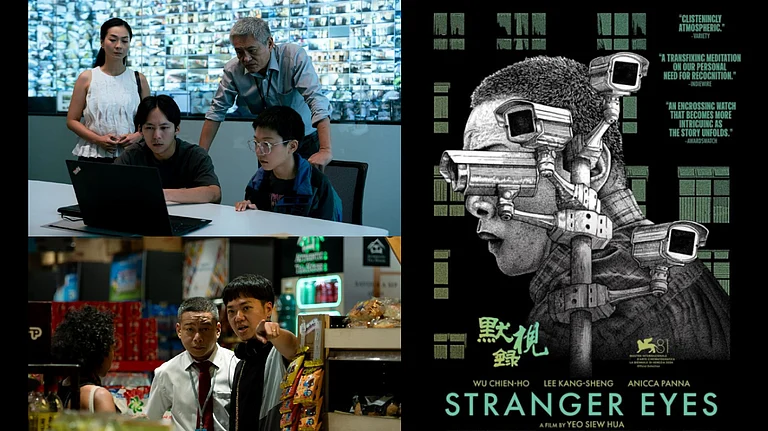Mussolini: Son of the Century premiered at the 2024 Venice Film Festival and has dropped on MUBI
Director Joe Wright delivers a stylized, punkish riff on the five years during which Mussolini rose to power
In this conversation, Wright and his actor Luca Marinelli discuss taking responsibility, fashioning the collage effects of the series, the ethical questions the project sparked.
Joe Wright & Luca Marinelli Interview | On Mussolini: Son Of The Century
The Oscar-nominated filmmaker (‘Pride & Prejudice’, ‘Atonement’) and Italy’s greatest living actor discuss their propulsive, techno-kinetic riff on Mussolini in their new MUBI series
In their show Mussolini: Son of the Century, Joe Wright and Luca Marinelli concoct a heady cocktail of heedless, unchecked power and social complicity through passivity, in a portrait of the titular founder of fascism. Over eight episodes, viewers are taken through a restlessly peaking as well as spiraling five-year span in Mussolini’s life between 1919 and 1925, while he cemented his position and Italian fascism crystallized. Wright fashions a sprawling, lurid canvas and a sonorous Marinelli plays it to the hilt. The finest Italian actor of his generation, Marinelli leans fully into the garish and grotesque, swinging frantically between disturbing comedy and straight-faced terror.
At times, the show, which premiered at the Venice Film Festival last year, repetitively strains with spelling its ideas. It could have done with considerable trimming, but Marinelli is so electric it’s impossible to look away. Ahead of the series release on MUBI, Joe Wright and Luca Marinelli sat down with an exclusive group of journalists, including Outlook’s Debanjan Dhar. The duo emphasized the need to assume responsibility for circumstances like those that made Mussolini’s ascendancy possible, instead of dismissing him as a monster. Edited excerpts from the roundtable:
Why do you feel Mussolini, despite being such a popular figure, hasn’t drawn as much screen interest as others like Hitler or Churchill?
Wright: After the war and his death, Italians swept the whole fascist period under the carpet and pretended it never happened. There’s no Nuremberg trial, there’s no truth and reconciliation, though there were violent local retributions. There was no national reckoning. Is that fair to say, Luca?
Marinelli: Yes, there were few movies but I agree with everything you said.
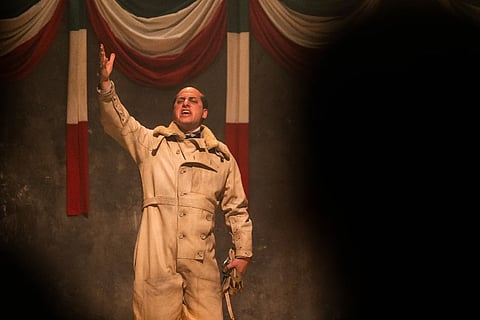
How did the decision to break the fourth wall in the narrative come about?
Wright: It was decided in development of the scripts. The book is like a collage of different forms, comprising letters, speeches, telegrams, newspaper articles and fiction. At the beginning of the book, there’s a tiny bit where Mussolini is speaking in first person. The idea was expanded from that indication in the book. In a way, it was an attempt to portray Mussolini’s control over the narrative. As the show develops, especially in the latter four episodes, he loses control. As these autocratic characters gain power, they somehow lose control paradoxically.
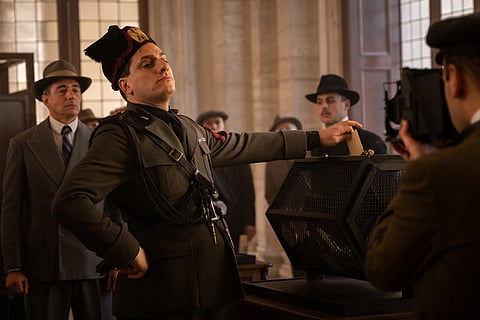
Luca, how much did you study Mussolini’s mannerisms, thoughts and gestures?
Marinelli: I saw a lot of things, yes. It came naturally that I had to do something with my body. I began occupying a bit more space in the room. I was prepared to devote all my energy.
Wright: He ate a lot of pasta and pizza and sandwiches! (laughs)
Marinelli: Then there were heaps of propaganda material where his triumphalist aspect asserted itself. But there were moments where you could sense slips in the control. I tried to communicate it with the audience. I read books written by him and about him. One of the important ones was by Bandinelli. He was an archaeologist said to be a tour guide to Hitler and Mussolini. He wrote about things he didn’t want to but was obliged to see, the work of these two criminals.
The series has been criticized for humanizing Mussolini. How do you respond to that?
Wright: It’s an interesting debate. I remember when George Bush was talking about the horrors of Abu Ghraib, he said those who committed those abuses had sickness in their souls and that they were evil. That somehow absolved him and all of us of responsibility. I don’t think that’s very useful. The idea of demonizing these characters isn’t useful for progress—personal or societal. We all have the potential for such darkness. It’s as if he were the shadow of masculinity. If we just say it’s a phenomenon and dismiss them as monsters, it’s purposeless. The truth is more immediate and it’s up to us to make the choice as to what kind of man or woman we want to be.
Marinelli: Among all of us, the work was beautiful and collaborative. I remember there was a line in his autobiography that struck me and Joe allowed me to retain it in a dialogue in the show.
Joe, because this is such thorny material and you’re playing with fire, was there a particular moment during filming when the weight of it all felt unnerving?
Wright: It did feel like a great responsibility, and we all took it very seriously. As often as it happens when you’re making something particularly dark, the only way to get away with it is through laughter. There was a tight group of actors and crew and we worked 420 days for the shooting. There was a lot of love in the room, despite the fact that we were depicting a lot of hate.
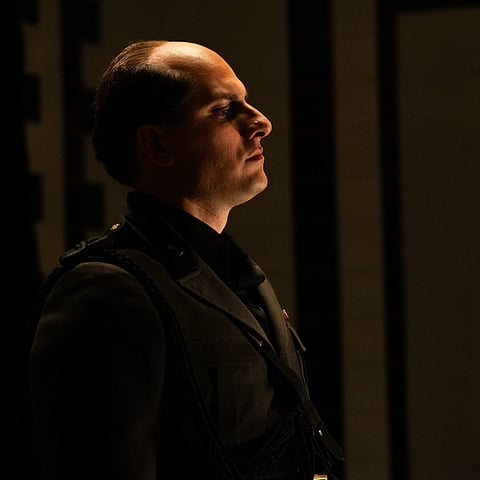
Luca, what goes through your mind before stepping out to say those loaded lines, deliver those speeches in front of massive crowds? How much of it is a matter of physical exertion and obsessing over and weighing the meaning and reach of those words?
Marinelli: A lot of the speeches in the show were his own words. I remember the parliament scenes being very tough. I really felt the violence and spite inside him. Artistically speaking, it was an amazing adventure, but the human and ethical side was difficult. One has to suspend judgement and say these words and be a part fictionally. But, as Joe said, we were a tight ensemble. There was great togetherness. We knew what we were going through and looked out for each other.
Mussolini is about the rise of a totalitarian leader. What parallels do you see to the modern day and the way political discourse is constructed today?
Wright: While working on the script, I would underline the parallels, which were too many. By the end, I realized it would be better if the audience was allowed to draw these parallels themselves. Certainly, the way in which Mussolini took legitimate concerns of the disenfranchised people and exploited them for his own gain is a major parallel. The amazing thing that Joe and the writers did was the combination of the past and present, music choices, the fourth-wall breaking. We tried to tap the fact that if you open your phone, you get all the politicians speaking directly to you.
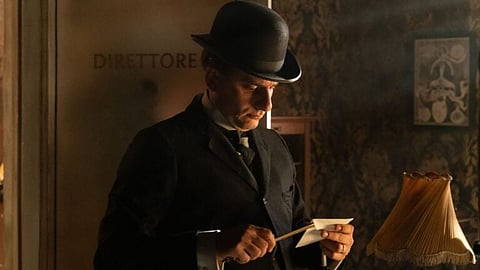
Luca, what discovery during your research surprised you the most or changed your view of him?
Marinelli: Well, I didn’t change my perception. He’s a criminal. I concentrated mostly on the five years the series shifts through. There were a lot of different things about how the power ended in the hands of this man that really unsettled me.
Mussolini: Son of the Century is streaming now on MUBI India.

